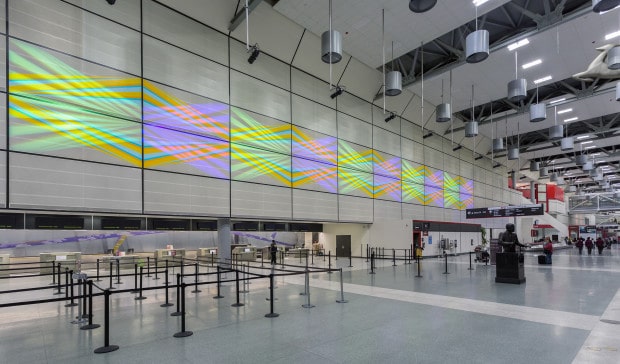
I just read an awesome article at the New York Times about unpaid internships, and how it’s looking like this kind of thing is illegal. The first time I read the headline, I thought to myself:
“Self, well DUH unpaid internships should be illegal. Free work for “credit?” Come on. I may have been born at night, but it wasn’t LAST night.”
Then I read the article and saw that the unpaid internship positions that exist in the USA are being investigated. I think that this is a good thing.
I have disagreed with colleagues over the years for HOURS about this very thing – exchanging “credit” and “experience” for what can sometimes be a 23-hour-a-day slave labor experience, day in and day out. I think that it is absolute horse hockey (that’s poop, kids) that this still goes on. I know that there are unpaid internships in the lighting industries, which is why this is relevant JimOnLight.com material. I also know that people get taken advantage of in these situations. It doesn’t take a genius to figure this out.
From the article:
No one keeps official count of how many paid and unpaid internships there are, but Lance Choy, director of the Career Development Center at Stanford University, sees definitive evidence that the number of unpaid internships is mushrooming – fueled by employers’ desire to hold down costs and students’ eagerness to gain experience for their résumés. Employers posted 643 unpaid internships on Stanford’s job board this academic year, more than triple the 174 posted two years ago.
In 2008, the National Association of Colleges and Employers found that 83 percent of graduating students had held internships, up from 9 percent in 1992. This means hundreds of thousands of students hold internships each year; some experts estimate that one-fourth to one-half are unpaid.
Come on. A quarter to a HALF of internships are unpaid? I think that this has a lot to do with the things that people tell students that they need to do when they’re trying to get a degree. It was no different for me when I was in school – I was told on several occasions that an unpaid internship helps you have a better chance of getting a job. I’m here to call BS on this, people. I wasn’t having that crap when I was in school – I looked for a summer gig to do in place of an internship for credit in undergrad, where an internship was a requirement for graduation in my program. So instead of getting abused, I went out as a master electrician on an opera tour and learned something new every day, AND got enough money to buy myself food (and cigarettes at that time, bad bad habit).
More from the NYT article – notice that the examples noted are all entertainment industry internships:
In California, officials have issued guidance letters advising employers whether they are breaking the law, while Oregon regulators have unearthed numerous abuses.
“We’ve had cases where unpaid interns really were displacing workers and where they weren’t being supervised in an educational capacity,” said Bob Estabrook, spokesman for Oregon’s labor department. His department recently handled complaints involving two individuals at a solar panel company who received $3,350 in back pay after claiming that they were wrongly treated as unpaid interns.
Many students said they had held internships that involved noneducational menial work. To be sure, many internships involve some unskilled work, but when the jobs are mostly drudgery, regulators say, it is clearly illegal not to pay interns.
One Ivy League student said she spent an unpaid three-month internship at a magazine packaging and shipping 20 or 40 apparel samples a day back to fashion houses that had provided them for photo shoots.
At Little Airplane, a Manhattan children’s film company, an N.Y.U. student who hoped to work in animation during her unpaid internship said she was instead assigned to the facilities department and ordered to wipe the door handles each day to minimize the spread of swine flu.
People, you have to use your brains nowadays. Try your hardest not to let people take advantage of you just because you’re a student. It’s true, sometimes internships pay, and a LOT of time an internship is something that you’ll get to learn a ton while you’re doing it – if the organization providing the internship has their stuff together to make sure you’re being taught. Also, you can plan on doing some scut work while you’re an internship, this is totally true. In the lighting industries, for example, if you’re working in entertainment lighting doing an internship, you could expect, for example, to be hosing the body fluids and mud off of feeder cable coming back into the shop from an outdoor music festival. We’ve all been there. You do it and you learn about that skill. You might also get to run a Hog or a grandMA or something else cool during your internship.
Just remember, you gotta take care of yourself too. So if you decide to take an unpaid internship for whatever reason, research it. Then research it again, and again, and then sleep, and do it one more time. Make sure that your time is worth what you’ll be getting.
Check out the NYT article here – great read. Read both pages, the whole article is a bit shocking. Also, thanks to withmyba.com for the hilarious image!






YES! Thank you! I think unpaid internships are (for the most part) wastes of time. If I am going to take time out of my schedule (which is already jammed, thanks to whatever production I’m working on here at school) to do absurd amounts of work, I want to be paid! Even if it it scrut work! I’m fine with that! But student’s need money too! It would be fantastic for me not to have to ask my parents for money every week. I look on places like Craigslist and see “internship” and I think “Oh, hey! Maybe I’ll check that out!” and as soon as it says “unpaid” I skip over it. Thankfully, I’m hoping to get a paid lighting internship at my school over the summer, but how many more paid lighting internships will I get the chance to have? I want to get experience , but I have found job opportunities for a college student hard to come by, apart from being on the IATSE D-list. All the big theaters here in the DC area have great internship opportunities, but they are all unpaid. It’s a shame, because I would love to get the experience. Show me a great paid internship and I would be all over it.
Great discussions here. I saw the NYT article http://s.nyt.com/u/Kuh last night as well and thought – “Hey I know some business owners who are building internship programs and ought to read this”.
Steve Duin wrote a good article on this in the Oregonian last month to check out: http://www.oregonlive.com/news/oregonian/steve_duin/index.ssf/2010/03/the_insidious_rise_in_unpaid_i.html
No doubt there are bad internship programs out there where young people get taken advantage of in their attempts to acquire relevant work experience and be more employable. The economy exacerbates the issue as jobseekers navigate today’s highly competitive job market where employers have their “pick of the litter”.
From my personal experience, the right “unpaid” internship can be extremely beneficial for interns both in terms of gaining invaluable exposure to career paths of interest, as well as providing work experience and credentials that can open doors down the road.
The responsibility falls on the business owner to ensure the integrity of their internship program meets the requirements outlined by Oregon’s Bureau of Labor and Industries http://www.oregon.gov/BOLI/TA/T_FAQ_Interns.shtml
For business owners that have internship programs, take a minute to check out Oregon’s criteria laid out by the Bureau of Labor Industries to ensure your program in compliance.
Thanks for posting this Jim! It was an interesting read because while I agree completely, I’m not in the position to do anything to help it. I’ve spent the past however many months applying for those 23 hour day internships just to get one on my resume, and the hope of learning something new and fascinating. In a lot of summer stocks currently, not only are you unpaid, but you have to pay tuition at whatever junior college is distributing the credits, plus rent to the program to live in their dorms. I had a moment two months ago or so when I read about an internship I was recommended for and had to say, “I can’t afford that.”
Then I did a double take.
I “can’t afford” to not sleep all summer coiling cable for free? How does that… Plane tickets, housing, tuition in the program, and living expenses for three-four months aren’t cheap. Plus, in programs without on-campus housing, most college students aren’t financially stable to secure a cheap temporary lease, especially if they or their family is already knee-deep in student loans. So, I had to turn down that opportunity.
But me not taking the position didn’t throw a single cog off. I’m one of HUNDREDS of lighting students (I think we sometimes forget how many we are) in the market for any way to get their feet in the door in an industry where networking is so important. And I don’t think anything is going to change soon. While we hope that cutting unpaid internships would increase the amount of paying jobs, companies are already letting people go in droves.
Again, thanks for posting this, Jim! Hoping for a change for the better.
PS. Are you reading this and looking for an intern?
Hi, I’m Daphne and I’m still in the market for a summer internship! Ignore everything I said above. I may know I’m worth more than working for free, but I would LOVE to pull 23 hour days sorting gel for you. Cause what can I say? I’m another lighting design BFA student who wants that experience. In fact, I’m really good at differentiating gel colors, if I do say so myself. I’d love to send you a resume, or have a brief interview. Send me an email and we’ll connect. Thank you.
Yes, thanks Jim. I subverted the internship requirement at school as well–that’s how I landed in Edinburgh for the Festival. I didn’t make a lot of money, but I was given housing and I was able to feed myself, while my cohorts at school were working the same (horrific) hours at the opera house, for nothing.
The economics are frightening, with so many of us trying to get somewhere in this industry–we’re cheap, so cheap, and we want to succeed so badly that we don’t cry foul about the way people take advantage of us for free or abusively cheap labor. I chew my lip over ads for electrician jobs that pay less per hour than I would get slinging espresso here in SF, and I’ve got a graduate degree. Can’t do anything but join Daphne in hoping for a change for the better…
(Daphne, want to talk about the Festival, girl?)
Comments are closed.